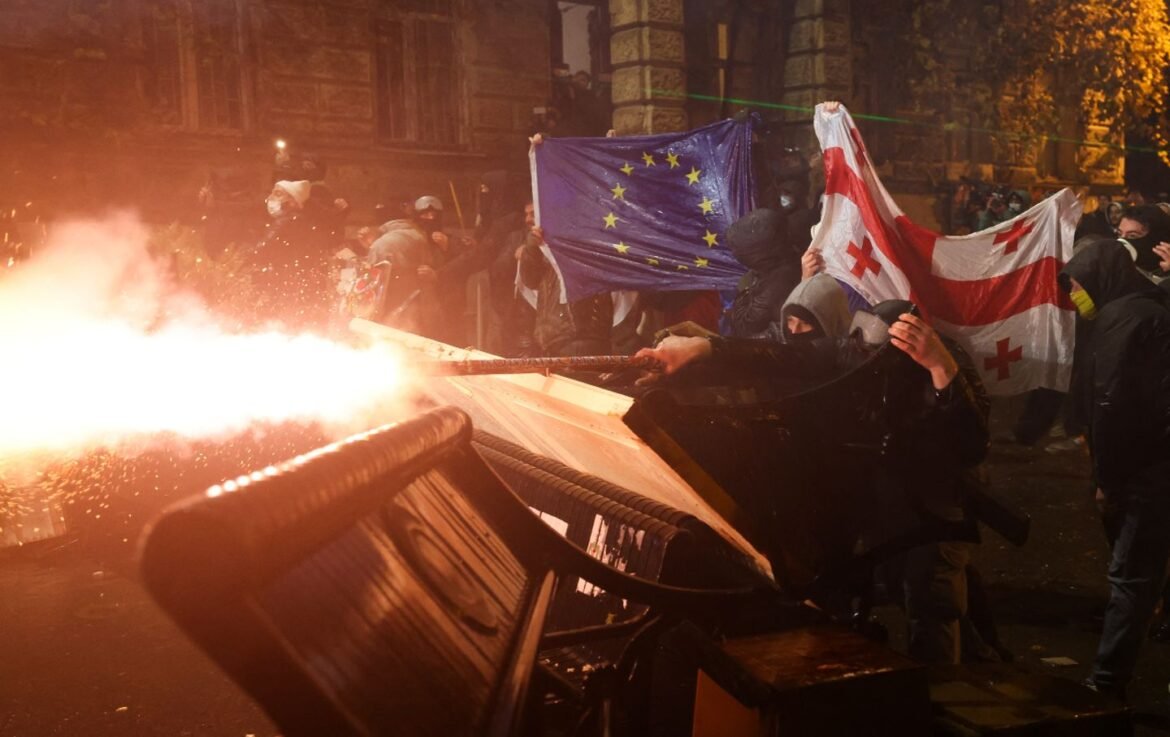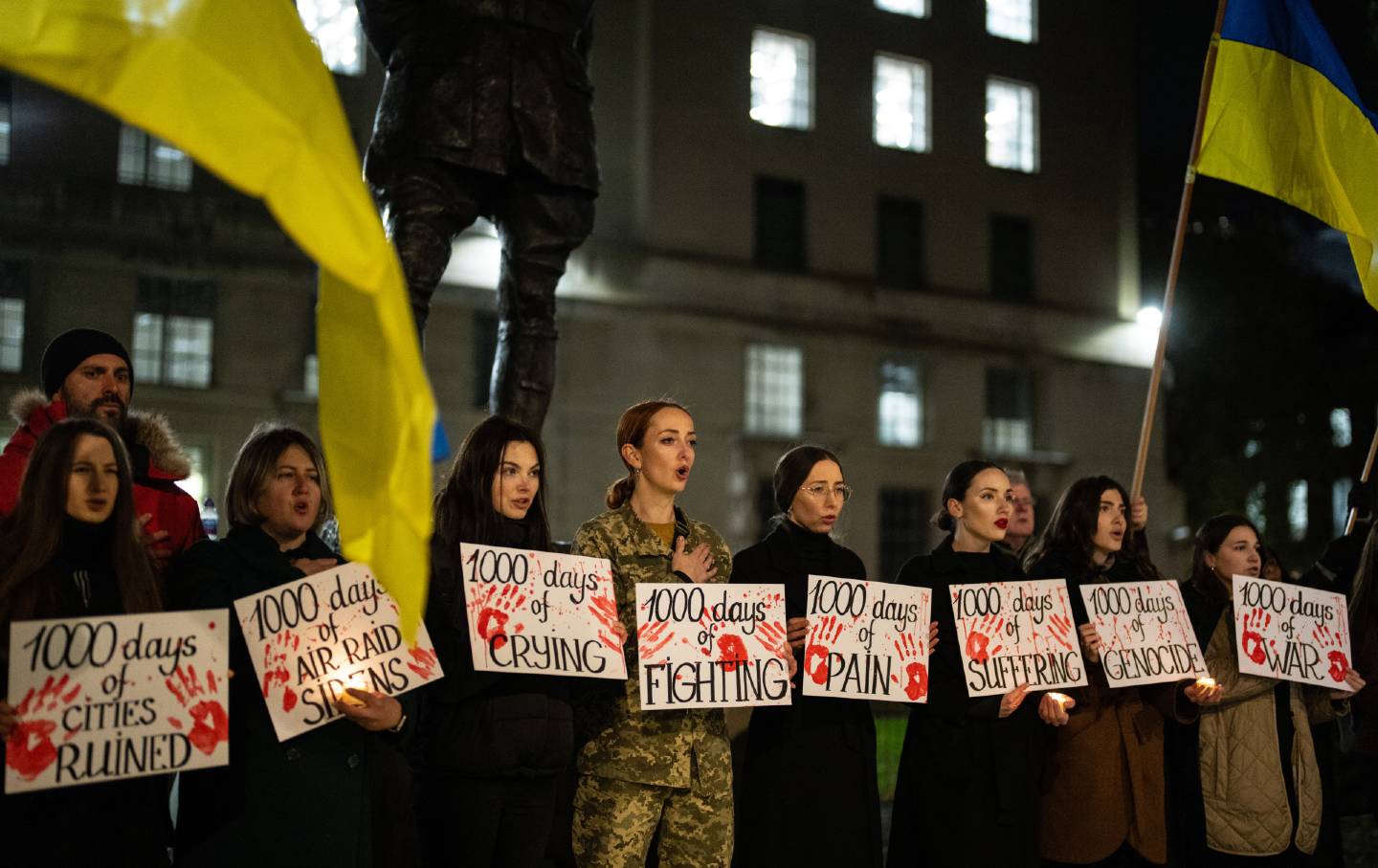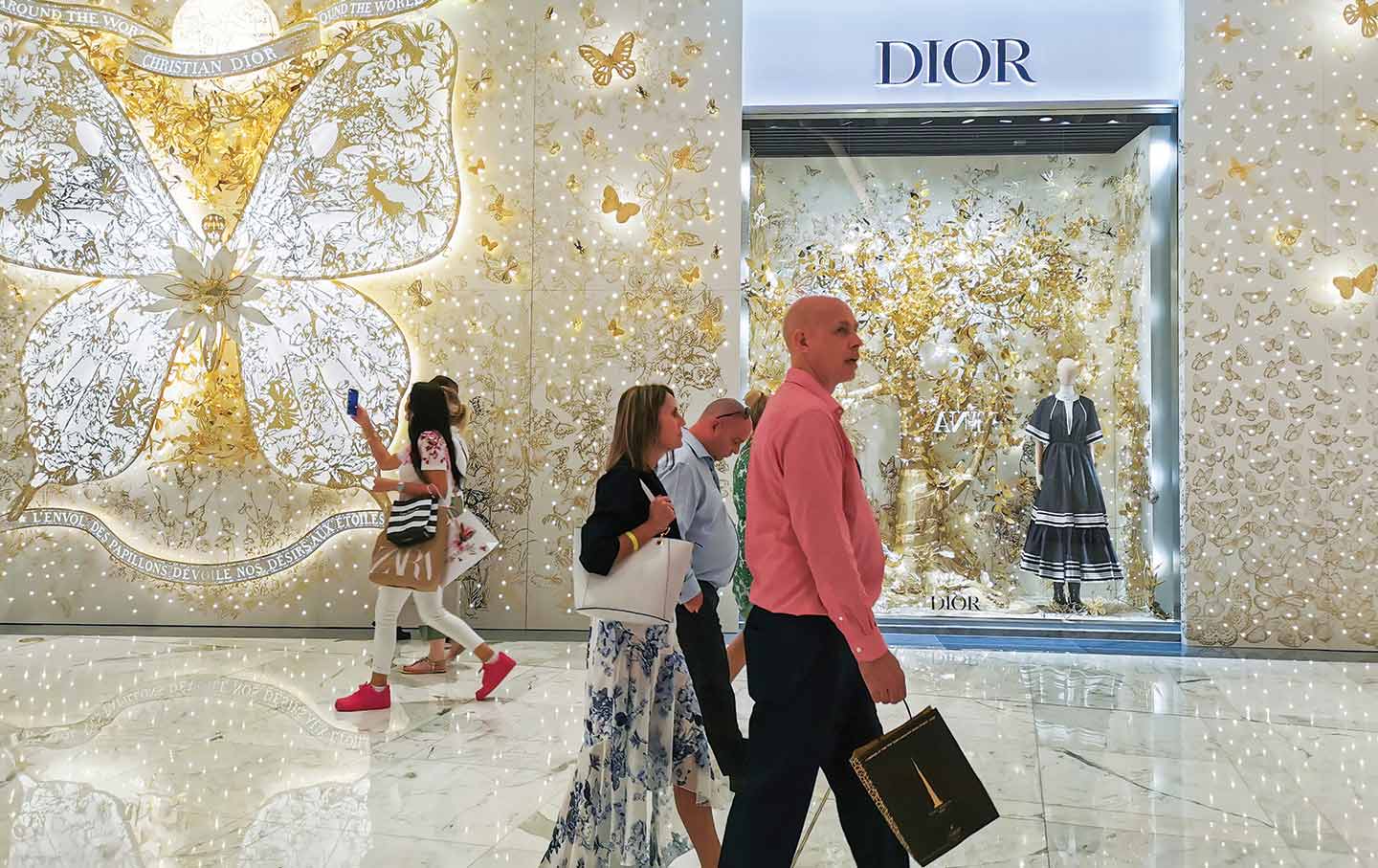The political crisis is escalating.
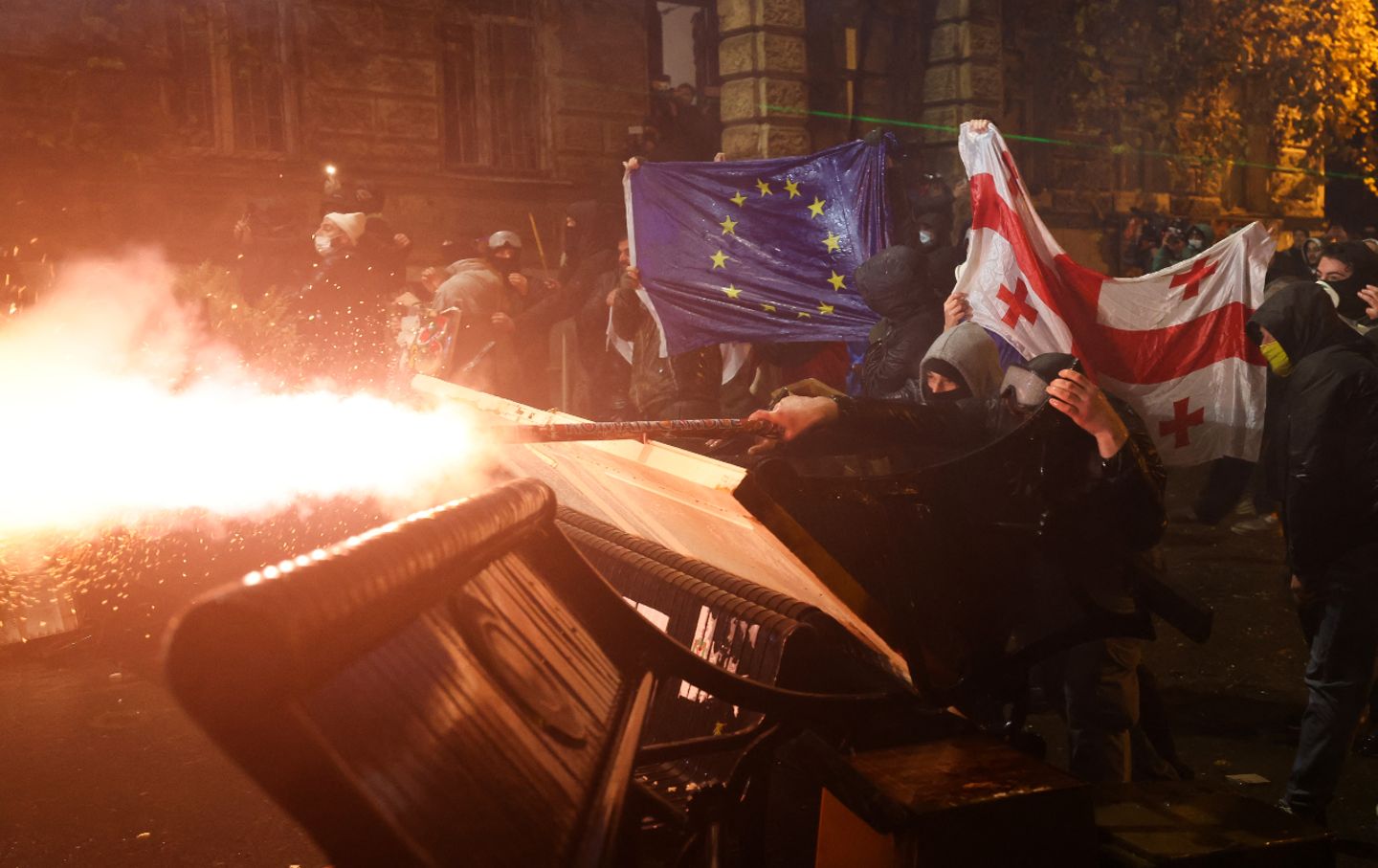
Over the past five days, dozens of protesters and police have been hospitalized as anti-government protests engulf Tbilisi, the capital of Georgia. In scenes reminiscent of Ukraine’s 2014 uprising against a president accused of abandoning European integration in favor of closer ties to Russia, pro–EU demonstrators, many wearing makeshift body armor, attacked riot police and have been filmed shooting fireworks and flares toward the Parliament building.
The latest chapter in the crisis began on Thanksgiving Day, when the European Parliament passed a resolution condemning Georgia’s recent parliamentary elections as “neither free nor fair,” part of a continued democratic backsliding “for which the ruling Georgian Dream party is fully responsible.”
Calling for fresh elections, the resolution demanded EU sanctions against Georgian leaders, including Prime Minister Irakli Kobakhidze, Tbilisi Mayor Kakha Kaladze, and parliamentary speaker Shalva Papuashvili. Georgia’s government responded by announcing the suspension of EU accession talks, which the EU had already frozen after Georgia adopted a law mandating foreign-funded NGOs to declare themselves as foreign agents.
Although the protests have brought Georgia’s political crisis to a dangerous new escalation, the government has been in limbo for more than a month after polls closed on October 26. Pro-Western President Salome Zourabichvili, whose post is largely ceremonial, has refused to accept the defeat of the opposition coalition she backed and has said she will not vacate the post when her term ends in December. She accuses the winning Georgian Dream party, which claims to support EU accession while also maintaining constructive relations with Moscow, of having stolen the election as part of a “Russian special operation” and has urged supporters to march on the seat of government.
Zourabichvili has rebuffed all requests to produce evidence to back up her claim that the election was stolen. And while the international observer mission noted that issues such as “intimidation, coercion and pressure on voters persisted, especially on public sector employees and the economically vulnerable,” it concluded that the election was “competitive” and “procedurally well-organized and administered in an orderly manner,” and that “contestants could generally campaign freely.”
Despite this—and the fact that the mission has yet to even publish its final report—a joint statement declaring that the vote had been “neither free nor fair” was signed by more than a dozen European and Canadian politicians in November, including the chairs of parliamentary foreign affairs committees in Germany, Lithuania, Ireland, and Ukraine. “Against this background, the European Union cannot recognize the result,” the statement read.
Over the past month, dozens of EU politicians descended on the capital, Tbilisi, to stand with Zourabichvili and put pressure on Georgia’s electoral commission to invalidate the vote. On the weekend of November 10, in an unprecedented challenge to diplomatic protocol, the chairs of the foreign affairs committees of Germany, France, Sweden, Finland, Poland, Estonia, Lithuania, and Latvia flew in to attend anti-government protests in front of Parliament.
There is no doubt that Georgia’s election was marred by the kind of dirty tricks witnessed in young (and not-so-young) democracies the world over, from scurrilous robocalls to attempted vote-buying—usually committed by incumbents. Georgian Dream officials and surrogates reportedly used massive funds from their shadowy paymaster, oligarch Bidzina Ivanishvili, to bus civil servants to voting stations, plaster streets with pro-government posters, and entice elderly and low-income voters with promises of freebies.
Groups of burly men of unclear affiliation lurked intimidatingly near voting booths and stared down opposition supporters, some of whom were later beaten by unidentified thugs. On one occasion, captured on video and shared virally on social media, an apparent Georgian Dream supporter lunged at a ballot box and rammed a fistful of ballots inside. (All the votes in that polling station were subsequently canceled.)
The international condemnation of Georgia’s vote contrasts sharply with the enthusiastic acceptance of a similarly controversial election in nearby Moldova. Its reelected president, Maia Sandu, a former World Bank official who ran on a pro-EU, anti-Russia ticket, was immediately congratulated by Western leaders after her victory—despite widespread reports of disenfranchisement and intimidation experienced by supporters of her rival candidate, former prosecutor general Alexandr Stoianoglo.
Yet Moldova’s election was hailed as a success by Western leaders, despite suffering from many of the same issues that have become rallying cries for Georgian protesters. If anything, they were compounded by a much more restrictive media environment than in Georgia, where—despite widespread accusations of authoritarianism—the opposition controls several prominent outlets, including the country’s second-most-watched channel. By contrast, Sandu’s avowedly liberal, pro-Western government presided over the shuttering of every major opposition media outlet, ostensibly as part of a crackdown on organized crime, oligarchs, and Russian interference. The effect was that, in the run-up to the election, Sandu’s governing party commanded a virtual monopoly over the airwaves—now controlled almost exclusively by her allies.
Perhaps even more concerning was the government’s apparent role in disenfranchising tens of thousands of citizens expected to vote against Sandu. According to 2021 figures from the Moldovan Ministry of Foreign Affairs and European Integration, Russia is home to the largest number of Moldovan expats, at 354,000. Yet the Moldovan government opened just two polling stations in the entire country, compared to 60 in Italy and 20 in Germany.
Another group of Moldovans overwhelmingly supportive of Stoianoglo but unable to vote in their home region were residents of Transnistria, the largely Russian-speaking breakaway republic that houses a major Russian peacekeeping contingent. Since 1992, the region has been run by a pro-Russian government. Chisinau does not recognize Transnistrian independence and considers its inhabitants to be Moldovan citizens (most hold Moldovan passports, often in addition to Russian ones). Yet, just as thousands of Transnistrians were preparing to enter Moldovan territory to cast their votes, Moldovan police claimed to have received a bomb threat and closed a key road bridge for several hours. Access to two other polling stations used by Transnistrians was also suspended due to bomb threats.
These examples of potential voter disenfranchisement by Moldova’s EU-friendly government were virtually ignored by the Western press and Moldova’s uniformly pro-EU media, which framed the contest as a geopolitical choice between Russia and the West.
“The election became about a civilizational struggle, an identity—being European,” said Glenn Johnson, a veteran journalist who has written about Moldovan politics for Le Monde Diplomatique. “And the reason for that is that Sandu’s brand of technocratic neoliberalism doesn’t really appeal to many Moldovans. They didn’t have a solid plan for how to improve Moldova, so they leveraged a toxic identity dispute within the country.”
Yet elections almost always hinge less on grand geopolitical narratives than on a mix of pocketbook issues, local matters, and the relative quality of individual campaigns. On all those fronts, polls showed growing dissatisfaction with the way Sandu’s government fell short of expectations on key issues from anti-corruption to the cost of living, in particular by presiding over a massive rise in energy prices following botched negotiations with Russia’s Gazprom, the country’s monopoly gas provider.
According to the official vote tally, 51 percent of Moldovans living inside the country supported Stoianoglo, in spite of his weak campaign, lack of name recognition, and blanket pro-Sandu media coverage. (Sandu won on the back of overwhelming support from diaspora Moldovans living in the West.)
Similarly, whether or not one accepts the official tally, approximately half of all Georgians still chose Georgian Dream, which, for all its manifold flaws, delivered on a significant part of its electoral promises. Georgia’s economy grew by over 9 percent in the first half of 2024—more than double that of Sandu-led Moldova during the same period. A significant portion of this growth resulted from the government’s decision not to sever trade links with Russia—a policy the opposition vowed to reverse. On the international front, it officially secured EU candidate status and took steps toward potentially resolving the decades-long conflict with the breakaway areas of Abkhazia and South Ossetia.
“There’s a lot of inequality, there are lots of problems, but Georgian Dream has achieved three big things,” said Bryan Gigantino, a Tbilisi-based historian and cocreator of the podcast Reimagining Soviet Georgia. “First, they have overseen a huge deepening in relations with the EU and NATO. Second, they are overseeing unprecedented growth. That’s just a fact. The growth is distributed unequally. It’s capitalist growth—it’s not actually what workers need, but it’s growth—you can’t deny it. And third, they have overseen no war.”
Popular
“swipe left below to view more authors”Swipe →
Crucially, it did not take its voters for granted—a criticism leveled at opposition parties that seldom ventured outside their existing urban strongholds. “The opposition relied on their voter base and the existential threat of Russia, and that is why they lost,” said Gigantino. Instead, Georgian Dream activists campaigned energetically across the country, including in mountain regions and the remote countryside.
“Georgian Dream actually campaigned for the elections. They went from one region to another, they went to villages, they went to cities, they organized party conferences,” Gio Meskhi, a labor historian at the Georgian Institute of Public Affairs, told me. “It doesn’t mean that they actually listened to the people, but at least they pretended to listen. Meanwhile, the opposition clung to Tbilisi, and they clung to the same one topic—that Georgian Dream is pro-Russian and we are pro-European and we want European integration but they don’t.”
As the former UK diplomat Ian Proud has observed, “making the Moldovan election a zero-sum tussle between Europe and Russia—rather than a vote about what ordinary Moldovans want to see happen domestically—risks making Moldova a new, much smaller, more economically vulnerable version of Ukraine.” Unsurprisingly, when both Georgian Dream and Stoianoglo portrayed Ukraine’s post-Maidan trajectory as a cautionary tale rather than a role model, it resonated with many voters fearful that provoking Russia could invite war onto their doorsteps too.
Such security fears, rather than any great love for the Kremlin, go a long way toward explaining Georgian Dream and Stoianoglo’s reluctance to antagonize Russia. “Nobody in the opposition is saying, ‘We want to turn away from Europe and go to Russia,’” said Vitalie Sprinceana, a Moldovan sociologist and cofounder of Platzforma.md, an online media outlet for social criticism and activism. “What they’re actually saying is, ‘Yes, we’re going to Europe, but we don’t want to make an enemy of Moscow because that can be very dangerous for our small country, and we’ve seen what happens in Ukraine when you go for a zero-sum kind of thinking.’”
A similar picture holds in Georgia. “The idea that the state is captured by Russia and that they are trying to bring it into Russia’s orbit is nonsense,” said Gigantino. “The Georgian Dream is not an anti-European or anti-EU force. [Prime Minister Irakli] Kobakhidze is a very pro-EU guy. It’s just that there are limits to how much state sovereignty they can sacrifice to follow what the EU says.”
Yet too many EU leaders continue to push for radical brinkmanship couched in the language of democracy. That may be self-defeating: By so publicly casting doubt on the results of Georgia’s election while wholeheartedly endorsing those in Moldova, the EU opened itself to accusations of hypocrisy.
Witness the bloc’s embrace of authoritarian states like Azerbaijan, whose strongman leader Ilham Aliyev was congratulated by European Council President Charles Michel and Ursula von der Leyen, president of the European Commission, after winning 92 percent of the vote in the February presidential election, in which no members of the opposition were allowed to compete.
“The EU’s acceptance of the results in Moldova but not in Georgia is the continuation of an established politics of double standards and the blatant use of democracy as a slogan only when it suits them,” said Ivan Katchanovsky, a professor at the University of Ottawa and author of The Maidan Massacre in Ukraine.
One way in which democratization has been weaponized by the EU is through the funding and promotion of NGOs. In Georgia and Moldova, which lack an organic tradition of Western-style civil society, almost all NGOs are EU- and US-funded. Yet they have developed an outsize influence on the political system and overwhelmingly favored Sandu and Zourabichvili in the elections.
“Whenever the government wants to pass legislation, what they do is consult the NGOs,” said Sprinceana. With foreign-funded groups now routinely replacing public debate and participation, NGOs “have become a substitute for the citizenry,” he added. “They’re thinking about themselves as the civilizing agents of the West in a kind of Third World country and treating the local population as backward.”
In Georgia, too, the opposition has aligned itself heavily with Western-funded NGOs, most of which, as in Moldova, enjoy little grassroots support. “The opposition was defending NGOs and using NGOs as a metric of democracy in Georgia, when the average Georgian has no connection to and no relationship with NGOs,” said Gigantino.
For some, this approach verges on the colonial. “When people talk about decolonization, it means only getting rid of Russia,” said Sprinceana. “But one mental, cultural, political, conceptual colonization is being replaced by another one.”
Today is #GivingTuesday, a global day of giving that typically kicks off the year-end fundraising season for organizations that depend on donor support to make ends meet and enable them to do their work—including The Nation.
To help us mobilize our community in this critical moment, an anonymous donor is matching every gift The Nation receives today, dollar-for-dollar, up to $25,000. That means that until midnight tonight, every gift will be doubled, and its impact will go twice as far.
Right now, the free press is facing an uphill battle like we’ve never faced before. The incoming administration considers independent journalists “enemies of the people.” Attacks on free speech and freedom of the press, legal and physical attacks on journalists, and the ever-increasing power and spread of misinformation campaigns all threaten not just our ability to do our work but our readers’ ability to find news, reporting, and analysis they can trust.
If we hit our goal today, that’s $50,000 in total revenue to shore up our newsroom, power our investigative reporting and deep political analysis, and ensure that we’re ready to serve as a beacon of truth, civil resistance, and progressive power in the weeks and months to come.
From our abolitionist roots to our ongoing dedication to upholding the principles of democracy and freedom, The Nation has been speaking truth to power for 160 years. In the days ahead, our work will matter more than it ever has. To stand up against political authoritarianism, white supremacy, a court system overrun by far-right appointees, and the myriad other threats looming on the horizon, we’ll need communities that are informed, connected, fearless, and empowered with the truth.
This outcome in November is one none of us hoped to see. But for more than a century and a half, The Nation has been preparing to meet it. We’re ready for the fight ahead, and now, we need you to stand with us. Join us by making a donation to The Nation today, while every dollar goes twice as far.
Onward, in gratitude and solidarity,
Katrina vanden Heuvel
Editorial Director and Publisher, The Nation
More from The Nation
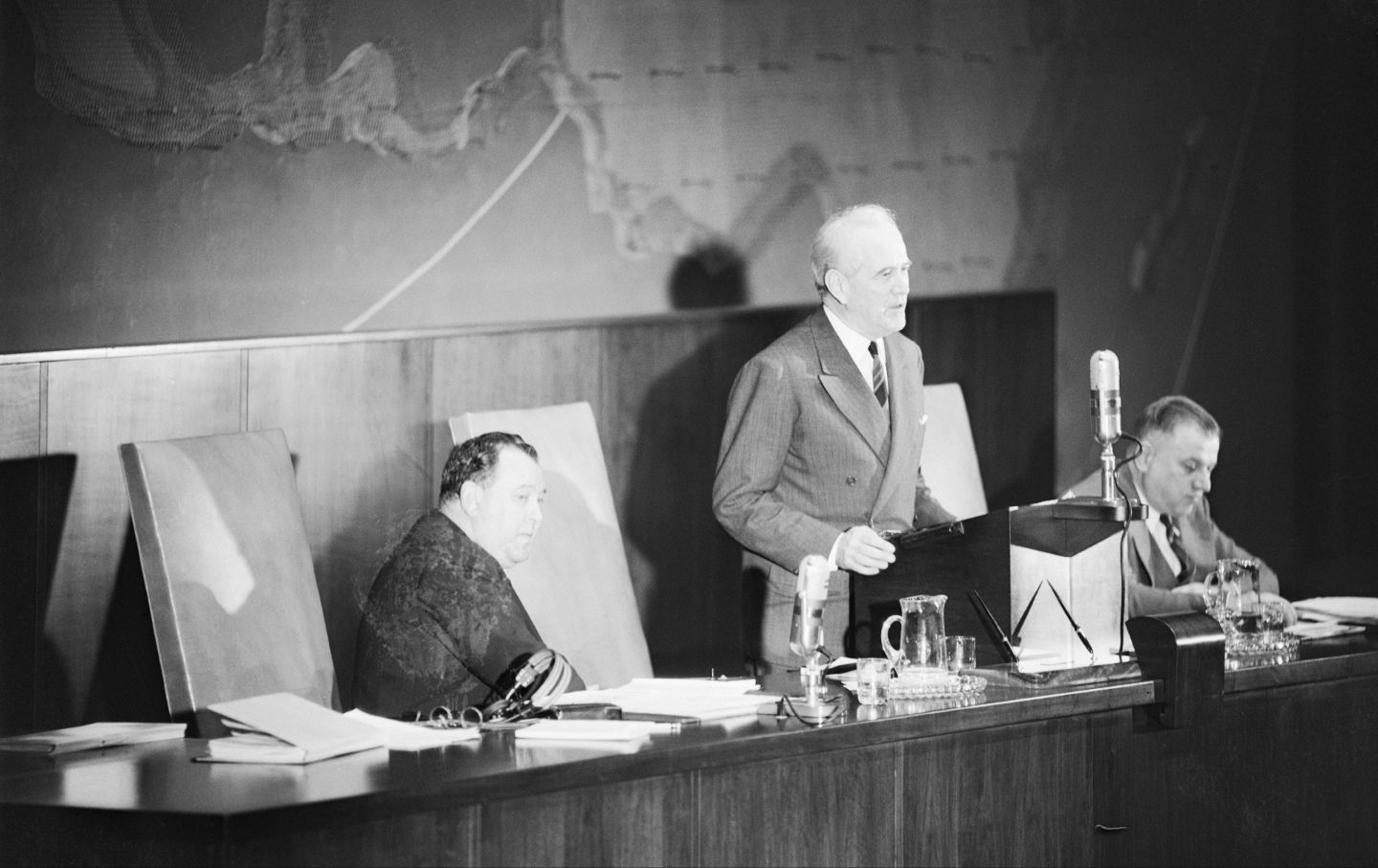
Though it is often seen as a target of Israeli aggression, the UN has always played a crucial role in the oppression of Palestinians.
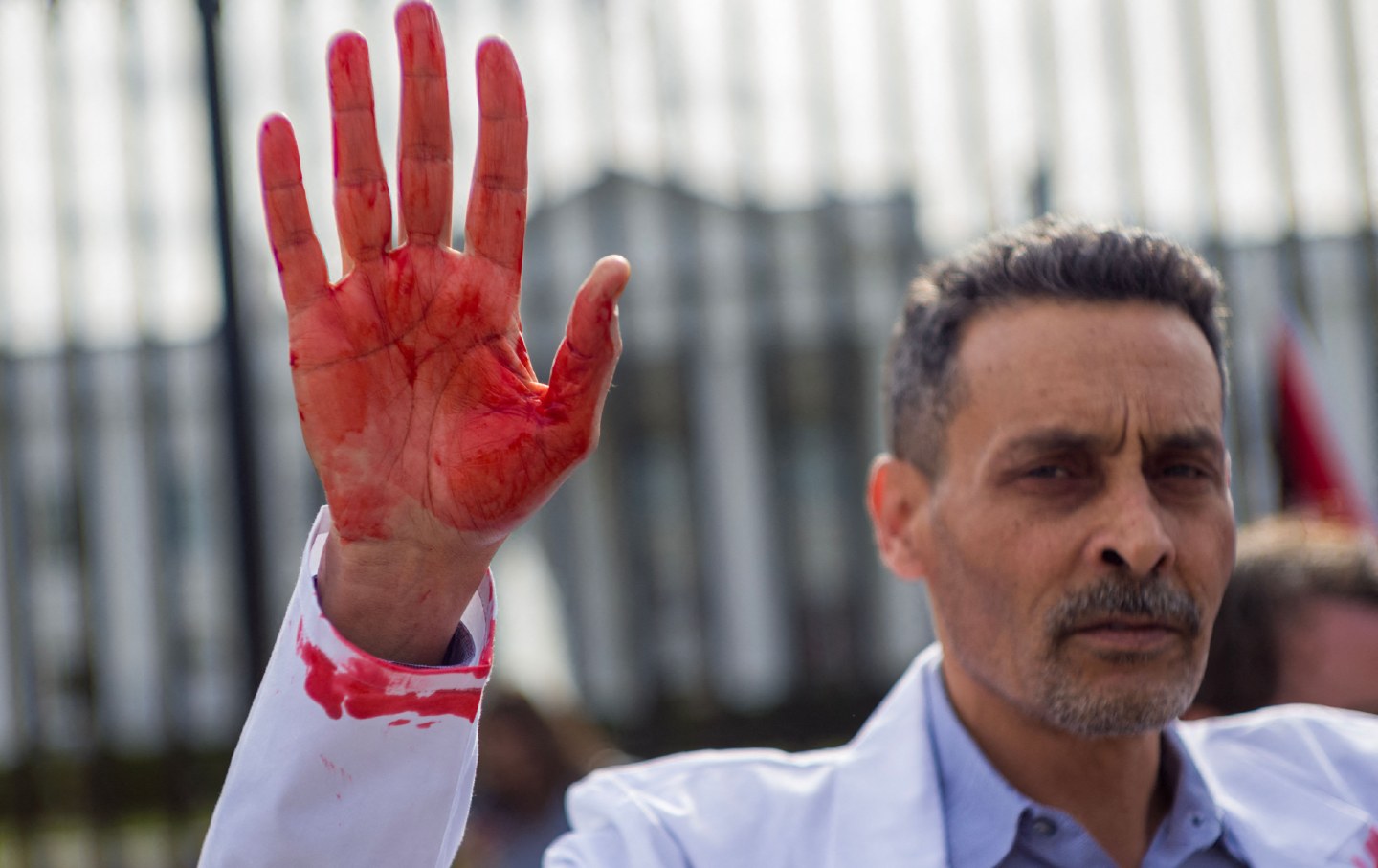
It is shamefully easy to keep going about one’s life while Israel continues its onslaught on Gaza with full US support—and it’s absolutely essential to resist that impulse.
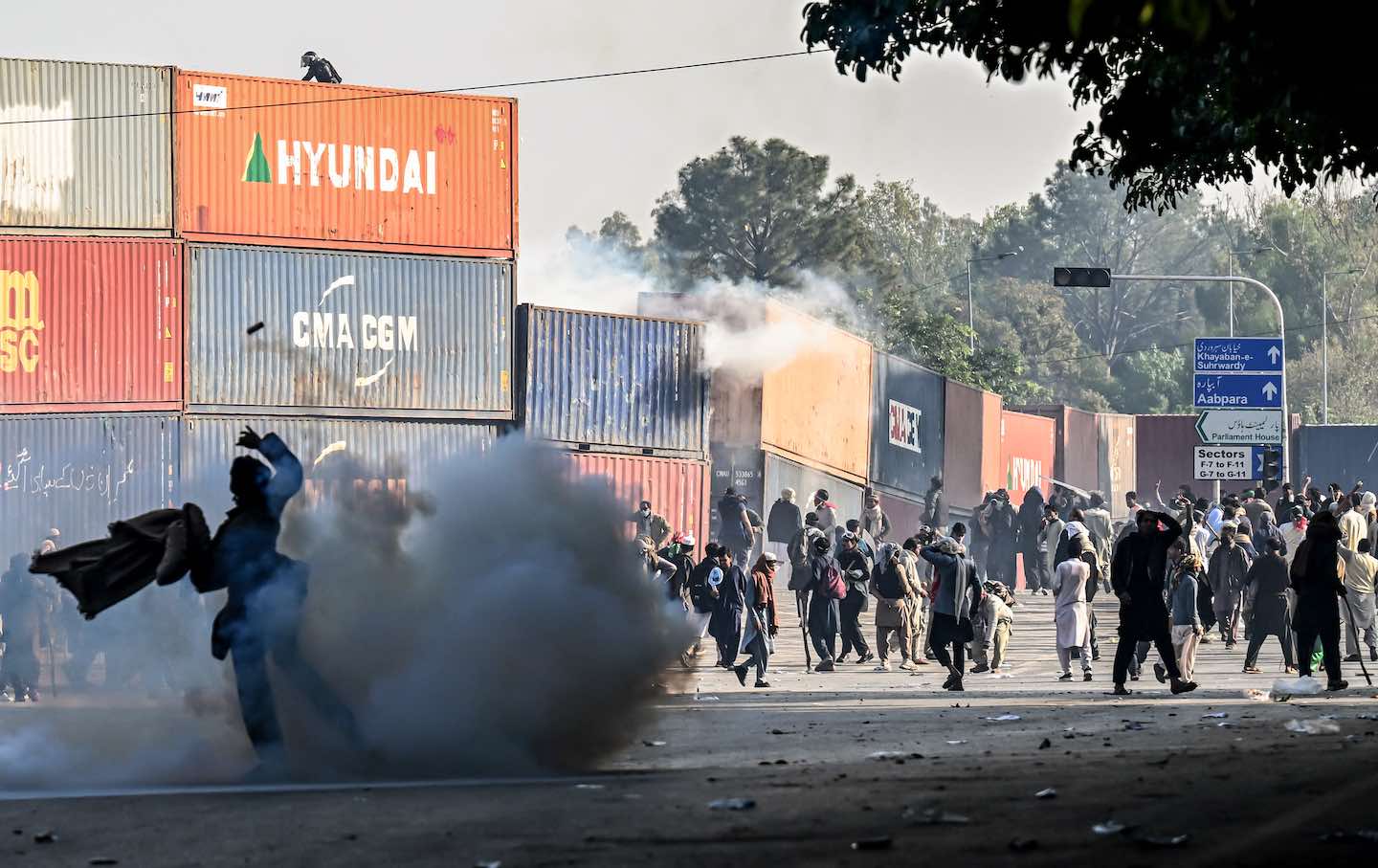
Protesters in support of Imran Khan’s PTI party were met with obstruction and violence, leading to mounting public outrage.
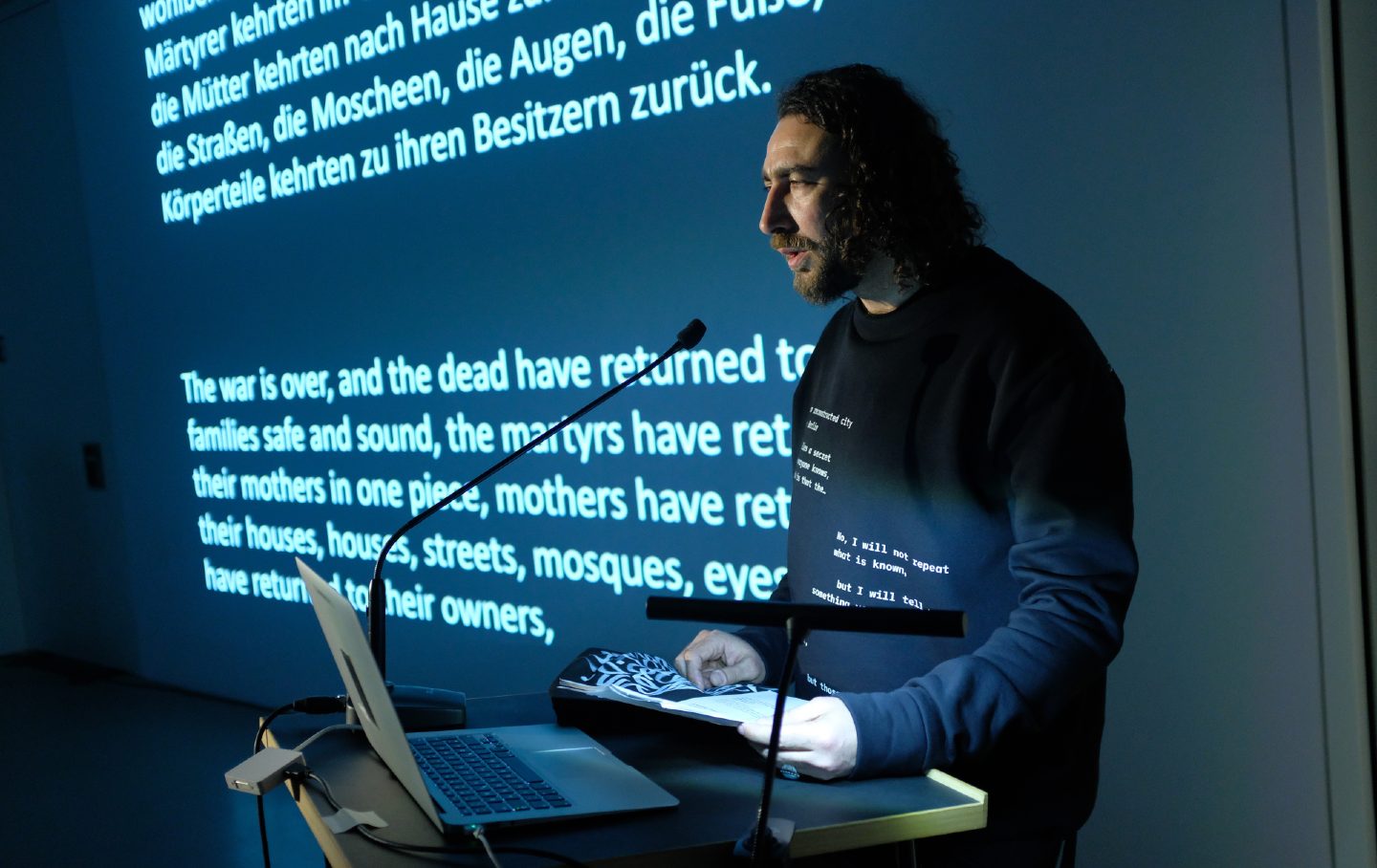
Ghayath Almadhoun had a poetry event in Berlin canceled simply because he’s Palestinian. At least 200 more artists have been silenced over Palestine in Germany since.
